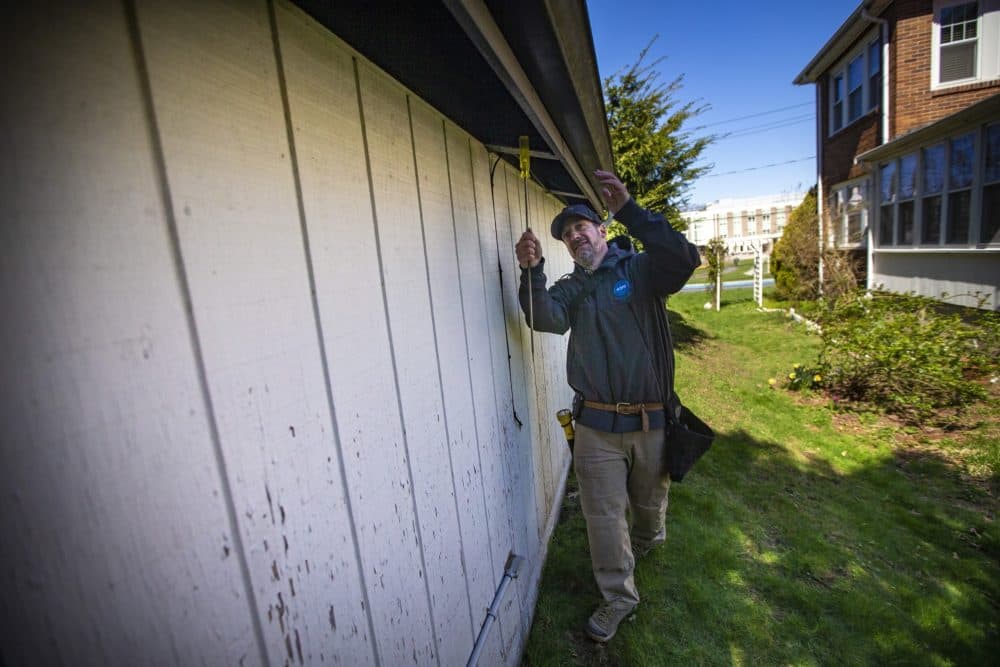Advertisement
Home inspectors urge state board to clarify law on shortcut inspections they say put consumers at risk
Resume
Home inspectors sparred over so-called shortcut inspections during a meeting with their state overseers Wednesday, disagreeing on nearly everything but the need for the state to weigh in on the practice.
In metro Boston’s heated real estate market, where home buyers often waive traditional inspections in order to win bidding contests, pre-offer “walk-and-talks” and “consultations” have been surging. But many inspectors are uneasy about the service, as detailed in a WBUR investigation. Critics say the practice leaves consumers at risk — and may put inspectors at risk too.
Revere inspector Stephen Verbeek insisted that the Board of Registration of Home Inspectors take a stand.
“We've got one side saying, ‘Yes, it's allowable.’ We've got another side saying ‘No,’ ” Verbeek said at the virtual meeting. His lawyer has given him a “hard no” on doing consultations, he said. “And now we have a situation here where potentially hundreds of thousands of consumers in the state of Massachusetts are getting this conflicting information.”
The board said it would have its legal counsel draft a policy statement, clarifying the law. But in the interim, confusion is rampant.
Everyone at the meeting agreed that a legal inspection in Massachusetts must result in a written report for the consumer. Less clear was the legal status of short “walk-and-talks” through a home, which are typically done at a discounted price and don’t include a report. They can take as little as 20 minutes, instead of the two- to four-hour examinations that look into the key areas of a home.
A number of inspectors said they think walk-and-talks skirt the law and put inspectors in the position of providing a service that’s well short of what they’re meant to do. Some said they’d been advised by lawyers that they could be personally liable if a client sues them after a mini-inspection.
Proponents of the practice have said it’s better for consumers to have at least some information about the house they’re making an offer on. And if inspectors don’t do consultations, less experienced people might.
Board member Liz Martin, who is also an inspector, said she sometimes does consultations for clients. She makes sure they understand it’s not an actual inspection, she said. And in her mind, they’re legal so long as they’re not called inspections.
“Real estate agents anxious to move sales forward are going to encourage — or advise, even — their clients to waive home inspections to make their offers ‘look appealing,’ is the line,” she said. “So if home inspectors don't do consultations, who will? Plumbers, electricians? Handymen?”
Dawn Ruffini, president of the Massachusetts Association of Realtors, in an interview after the meeting said buyers are the ones making the decision to waive full inspections.
“We recommend everybody have a home inspection,” she said. But some buyers "may only be concerned with what the age of the heating system or the condition of the heating system is. And if there's an inspector that's willing to provide just that information, then, you know, that's their business practice, I guess."
Board chair Michael Healy, also an inspector, asked the group’s legal counsel to draft some kind of clarification for the industry and the public. But he said the board’s enforcement ability is generally limited to reviewing complaints.
Sen. John Keenan, senate chair of the legislature's Joint Committee on Housing, in an interview said the board has “fairly broad discretion in determining the activities that somebody who possesses a license can engage in.”
An inspection with no report “runs afoul of the statute and the regulations,” he said, but the regulations don’t spell out what inspectors cannot do.
“Given the competitive market we have now, we want to make sure that those safeguards are in place” for buyers and sellers, Keenan said. To the extent that there’s grey area, he said, the board should review it. “And if there's a recommendation or request from them to look at it legislatively, then we're happy to take that look at it.”
The board next meets on June 15.
Martin, the board member, noted that inspectors would prefer to do full inspections, but are simply reacting to market demand in doing brief property reviews.
“From a consumer protection standpoint, we would rather do home inspections. That is the best way to protect our clients. For some reason, banks and real estate agents don't seem to care,” Martin said. “Why anybody would make the biggest … expenditure of their life and not have a home inspection, I don't understand.”
This program aired on May 11, 2022.

